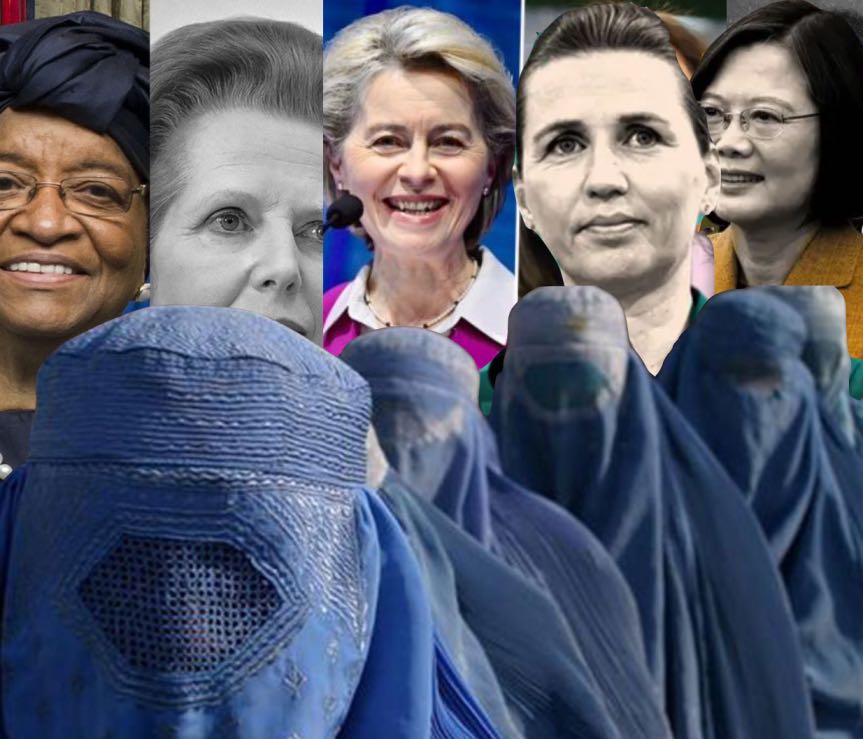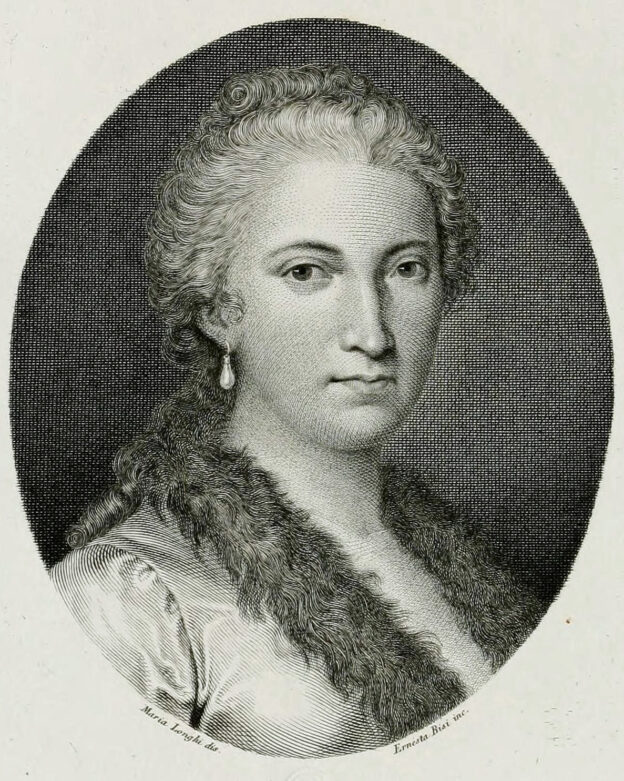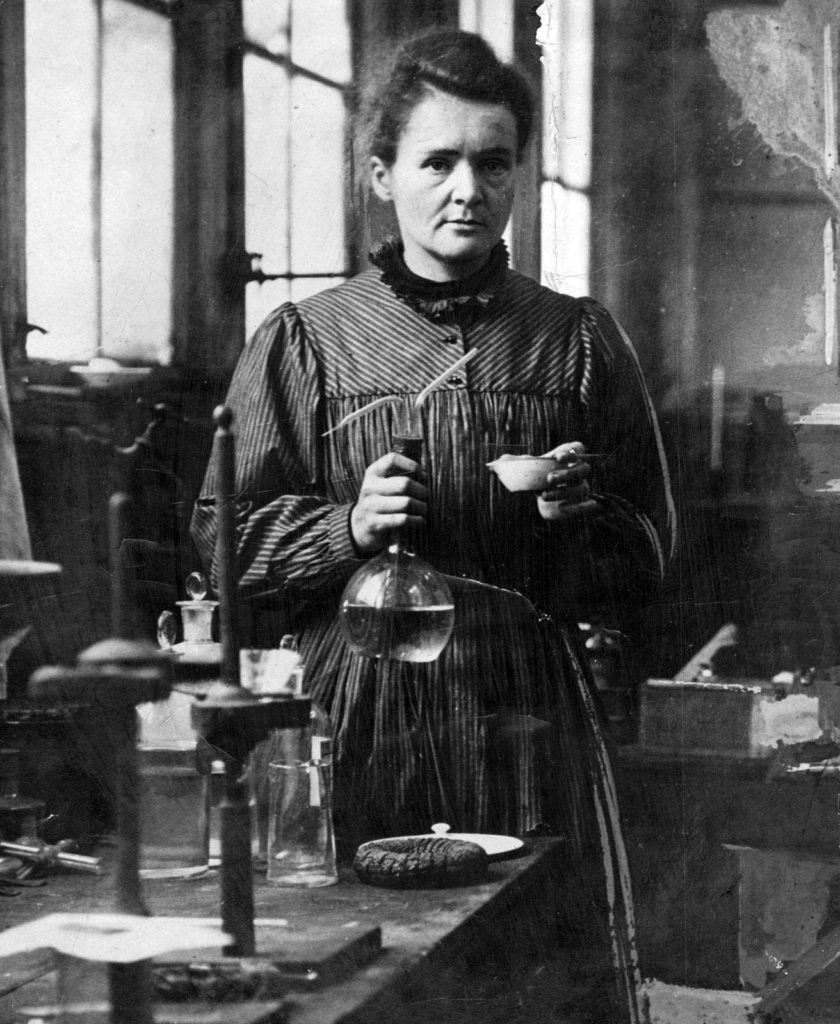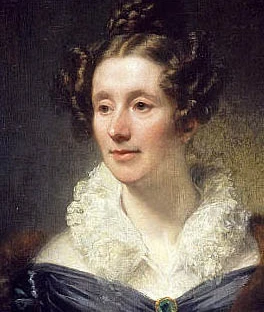
There is a law in physiology that says that any organ in the human body, if not fully used, decays. When men imprisoned women at home and forbade them to hunt and run, her muscles tightened. However today, in Europe and America, we see women who have been attending gym training centers, and their muscles have grown to a level that exceeds the muscular capacity of ninety percent of all men, and some of them play rugby and their muscle strength is superior to that of many men. Women have joined armies and performed all the tasks performed by men, and even in the police European and American women have become leaders with men serving under their command. In the realm of politics, women have become presidents or prime ministers in First World countries.
SINCE EDUCATION THROUGH THE AGES was forbidden to women (even in Europe up until the end of the eighteenth century), their mental abilities could not bloom at the same level as those of male scientists who had studied at universities and attended scientific conferences and meetings. They were just like illiterate men in this respect.
But when women were allowed to be educated and enter college, women proved that their minds could surpass men in several functions such as memory tasks and thinking in several directions in parallel (‘thinking outside the box’), and have outperformed males in scientific competitions. Women constitute more than sixty percent of medical students in most countries of the world, including Arab countries (particularly in Saudi Arabia, Kuwait and the rest of the Gulf countries, whose young males are less inclined to educational attainment than to amusing themselves and chasing antelopes – hunting being the first function man learned at the beginning of his life).
Now if we take a look at the scientific history of women in Europe since the eighteenth century, we find women emerging conspicuous, women such as the following:
Maria Agnesi (1718–1799).
Maria’s father was a professor of mathematics at the University of Bologna in Italy, and it was customary at the time for the daughters of the nobles to study in the convent and learn religion, housekeeping and knitting. But Maria’s father hired private tutors for her and she learned five languages (Greek, Latin, French, Hebrew and Spanish) and studied philosophy and the natural sciences. Her father held periodic meetings at his home for fellow scientists, and the thirteen-year-old Maria argued with them in all languages, especially Latin, which at the time was the language of science.
In 1738 she published her debates in a book that included topics such as the mechanics of celestial bodies and Newton’s theory of gravity. In 1738 she published a book on mathematics which contained studies in algebra, arithmetic, trigonometry, and geometry. In 1750 she was appointed professor of mathematics at the University of Bologna, becoming the first female professor of mathematics in Europe.
Maria Mitchell (1818–1889)
Her father was an astronomer and Maria was in charge of the city’s library, and so she used her time there to read books on mathematics and astronomy, helping her father calculate the positions of the stars. She discovered a comet which was named after her. When the first women’s university was established in America in 1865, Maria became the first professor of astronomy at that university, Vassar College. She was subsequently elected president of the Association for the Advancement of Science.
Marie Curie (1867-1934)
Born in Poland and educated to university level, Marie Curie was not allowed to graduate in her studies, so she emigrated to Paris and joined the Sorbonne University, where she studied physics and then chemistry. She discovered atomic radiation in radioactive material and named the element Polonium after the country that deprived her from graduate studies. She then went on to discover Radium. Marie Curry is considered to be the mother of modern physics. She was the first woman to hold the position of professor at the Sorbonne and the first person in the history of the Nobel Prize to receive two prizes: the first in physics in 1903 and the second in chemistry in 1911.
Mary Somerville (1780-1872)
Born in 1780 in Scotland by the age of fifteen years she had detected some algebraic problems in a magazine and decided to solve them, following which she obtained and studied a copy of Euclid’s Elements of Geometry. In 1826 she moved to London and began publishing scientific articles from her own research. In 1826 she published a lengthy paper for which she received the Gold Award of the Royal Society of Geographers. It was then translated and added to the French scientist Laplace’s theory of celestial body mechanics (La Place’s Celestial Mechanice). She was then elected to the Royal Society of Astronomers, the first woman to become a member of that society. She went on to published several books, including On Molecular and Microscopic Science. [1]
Several European and American women have won the Nobel Prize for Science, including: Marie Curie and Maria Goeppert Mayer for Physics, Marie Curie, Irene Joliot Curie, Dorothy Crowfoot Hodgkin and Ada Yonath for Chemistry. Twelve women have won the Nobel Prize for physiology and medical sciences, and twelve women for culture and writing,
Why have Arab women throughout the ages remained ignorant, illiterate and hidden under a black tent?
Now if Western women have proven their mental and physical competence to do everything that men do, and at times surpass them in some fields, why have Arab women throughout the ages remained ignorant, illiterate and hidden under a black tent worse than being buried under the dust?
No sane person doubts that the reason is Islam, a religion which has turned women into devils promoting deviancy and tempting men to immorality, as well as being ‘deficient in reason and religion.’[2]
The Messenger of God said: “Do not settle your wives in their own rooms and teach them to write. Do not teach them Sūrat Yūsuf; teach them the spindle and Sūrat al-Nūr”.[3]
There are many hadiths like this in al-Bukhārī and others. Islam has made women inferior to men in everything, starting with the Qur’ān which says that
men are a degree above them … because Allah hath made the one of them to excel the other,[4]
followed by the Sunna of the Prophet of Islam, who set for the birth of a boy the celebratory sacrifice of two sheep, while for the birth of a girl one sheep. He said that if the boy wets his clothing, it is to be wiped by water, but if a girl wets her clothing, the whole garment must be thoroughly washed, although from a scientific point of view there is not the slightest difference between the urine of the male child and the urine of the female child.

Suggested Reading
With such teachings, the jurists have been brainwashing the minds of boys and women from their earliest years, so they grow up believing that God prefers men over women. Women were convinced that they were created for the purpose of sexually pleasing and serving men, and therefore in performing these functions there was no need for them to be educated. ‘Alī ibn ‘Umar ibn Husām al-Dīn al-Buṣīrīi, known as Ibn al-Batnūnī says in his book On the Machinations of Women that
the Messenger of Islam gave some advice to his daughter Fāṭima, saying “O Fāṭima, no woman ever to her husband “go away!” without God Almighty and the angels cursing her. No women ever frowned at her husband without God and the zabāniya of Hell[5]becoming angry with her.
If you forbid him from your bed, all manner of things will curse her. O Fāṭima, any woman who prays for herself without mentioning her husband will have her prayers rejected by God until such time as she does include her husband. O Fāṭima, any woman who dresses and leaves the house without her husband’s permission will have all and sundry cursing her until she returns to her house. O Fāṭima no woman may look at her husband’s face with a frown without God and the angels being angry with her. O Fāṭima, no woman has ever revealed her face to anyone other than her husband without God delivering her face into the fires of Hell. O Fāṭima, no woman ever let into her house what her husband hates, without God letting seventy snakes into her grave and letting seventy scorpions of hell sting her right up to the Day of Resurrection. O Fāṭima, if any woman prays of her own accord without asking her husband’s permission, God will simply reject her prayer.
So, if even praying is not acceptable to God unless it is with the permission of the husband, what chance is there for learning?
[1] Somerville College in Oxford University was named after her. Some of its distinguished students include Margaret Thatcher, prime minister of the United Kingdom from 1979-1990 who studied chemistry at the college, working as a research chemist before becoming a legal barrister. Another student was Indhira Gandhi, prime minister of India from 1966 to 1977 and again from 1980 to 1984 who studied there history, political science and economics. (Ed.)
[2] From the Prophet’s hadith: “I have never seen anyone deficient in reason and religion more overwhelming to a man of wisdom than you [women]…. The lack of discernment is the fact that the testimony of two women is equal to the testimony of one man; this is their lack of reason. And (a woman) spends several nights when she does not pray, and she does not fast in Ramadhan, and this is their lack of religion.” Sunan Ibn Mājah, 4003. (Ed.)
[3] Al-Qurṭubī, الجامع لأحكام القرآن Vol. 12, Sūrat al-Nūr, verse 1. The Sūrat Yūsuf contains the tale of the Egyptian’s wife attempting to seduce Joseph, and her accusations of his attempts to dishonour her. Sūrat al-Nūr contains warnings against fornication and punishments relating to adultery, the exhortation for women to be married and exhortations to modest demeanour. (Ed.)
[4] Qur’ān sūras II (al-Baqara), 228 and IV (al-Nisā’), 34.
[5] The zabāniya are angels in Hell who torment the damned by thrusting them into fire. (Ed.)



